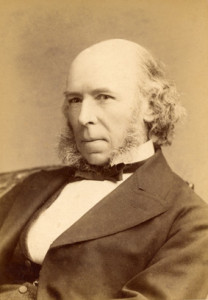 In the later decades of the 19th Century, the British philosopher, Herbert Spencer, took an honest look at world trends and predicted that civilization was on a downward trend, for culture, beauty and ethical practices were neglected in society.
In the later decades of the 19th Century, the British philosopher, Herbert Spencer, took an honest look at world trends and predicted that civilization was on a downward trend, for culture, beauty and ethical practices were neglected in society.
He believed that politicians were not likely or able to change the trends. If there was to be a change, how would it come about? He believed the poets, visionary thinkers and artists of the world would have the solution. In Britain he inspired men such as Rudyard Kipling, Sir Arthur Conan Doyle and Charles Darwin to consider the problem. In America, his friends Ralph Waldo Emerson, James Howard Bridge, Richard Watson Gilder, Oliver Wendell Holmes, Walt Whitman, Edwin Markham, Henry Holt, John Burroughs, Mark Twain and Andrew Carnegie took up the question.
These men, searching for a way in which to change the negative direction of society to positive action, formed a gathering, calling themselves the Twilight Club, because they met at twilight—not simply the twilight of the day, but, as they saw the situation, they were meeting at the evening twilight of the 19th Century and the morning twilight of the 20th Century—at the twilight of civilization, unless the downward trend could be stopped.
Their conviction was that world peace, harmony and unity would only come about through the brotherhood of man. They were convinced that a person’s moral creed could not remain as words and platitudes, but must be translated into action. Building on this idea, they formed The Poets’ Code of Ethics, intended as a worldwide moral code that related strictly to how people acted towards each other, the ethical nature of the code being based on the concept of service to others and to the world.
POET’S CODE OF ETHICS
1. Attain the Brotherhood of Man ideal by givingrighteous action and good will service to every man, instead of taking from him that which he hasDiscover that all men are extensions of each other – that man is made for man – and that the hurt of one man is the hurt of all men
2. Develop character, intelligence, and good citizenship by teaching every man from early youth to be a good neighbor and loyal citizen.
3. Discover man’s inner Self by awakening within him that spark of divine Light which lies dormant in every man
4.Realize that work done for the material world should be for man’s ennoblement, and not for grinding his Soul out in the years of industrial machines.
5. Know that Man is Mind, not body
6. That he is immortal Spirit, Not mortal flesh
7. and that he is good, Not bad
8. Judge the righteousness and religion of any man by what he does to his fellow man and not by his beliefs, doctrines, creeds,or dogmas
Herbert Spencer
Walt Whitman
Edwin Markham
Mark Twain
Ralph Waldo Emerson
Oliver Wendell Holmes
John Burroughs
Walter Russell
Lao Russell
